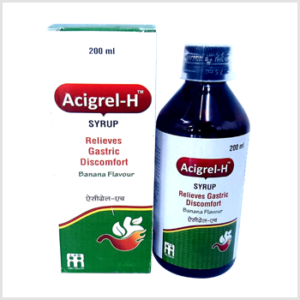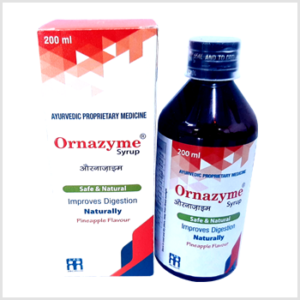Acigrel h Syrup
₹400.00 Original price was: ₹400.00.₹300.00Current price is: ₹300.00.
Description
STOMACH DISORDERS
Stomach Disorders are the problems of digestive function characterized by discomfort and pain in the abdominal region. Some other symptoms such as bloating, regurgitation, nausea or heartburn etc. may also be present.
Some common stomach diseases
Hyperacidity- When there is an excessive amount of hydrochloric acid in the stomach; the condition is known as Hyperacidity. Hyperacidity further results in heartburn, nausea, bloating and regurgitation. When hyperacidity occurs on regular basis, and left untreated, it turns out to be gastroesophageal reflux disease (GERD).
Gastroesophageal reflux disease (GERD) – It is a very common problem presenting as heartburn, acid eructation, and sensation of stomach contents coming back in food pipe.
Gastritis- It is an inflammation of the protective lining of the stomach. Weakness or any damage in the stomach lining allows digestive juices to damage and inflame the lining, causing gastritis. H. pylori infections and prolonged use of Non-Steroidal Anti-Inflammatory
Drugs (NSAIDS) are other causes of gastritis. Symptoms of gastritis include pain in the upper belly, which can range from a dull ache to an intensely sharp or burning pain, feeling bloated, decreased appetite, nausea, and vomiting.
Peptic ulcer disease (PUD) – It is a condition in which ulcers and sores develop in the lining of the stomach or in the duodenum. The three common forms of peptic ulcers include Helicobacter pylori (HP) – associated ulcers, Non-steroidal anti-inflammatory drug (NSAID)–induced ulcers, and stress-related mucosal damage (also called stress ulcers).
Gastroparesis– It is a condition in which stomach takes too long to empty itself and there is no blockage in stomach or its passage.
Dyspepsia or Indigestion– It’s a condition of impaired digestion. Symptoms include upper abdominal discomfort, burning sensation, bloating, flatulence, nausea or early satiety (feeling full too quickly after eating small amount of food).
Common stomach problems according to ayurveda
In Ayurveda the stomach diseases are related to imbalance of pitta and agni. Describing the Samprapti of Amlapitta Acharya Charaka says that Aamvisha (toxins), when get mixed with Pitta, the disease Amlapitta develops whereas Acharya Kashyapa described that the disease is caused by vitiation of Doshas (Tridosha) causing Mandagni which leads to Amlapitta. Therefore, imbalance in Pitta and Agni is considered to be the responsible factor in pathogenesis of Amlapitta. Amlapitta can be correlated with Acid Reflux Syndrome which comprises of various types of Gastro-esophageal Reflux Diseases like Gastritis, Dyspepsia, Heartburn, Hyperacidity etc. described in modern sciences.
Certain other factors like excessive intake of spicy, sour, pungent, oily and junk food items, untimely food habits, excessive consumption of tea/coffee, alcohol, tobacco, smoking, certain chemical drugs, especially some pain-relieving and anti-arthritic drugs and stress also lead to acid peptic disorder.
In Ayurveda the treatment principle of Amlapitta is to maintain balance of vitiated Pitta Dosha and Mandagni. With this treating principle agnimandya and ama formation is corrected which is known as the main causative factor of Amlapitta.
Composition
Each 5 ml of syrup contains
Aqueous extract derived from: Patolpatra 200mg, Pittpapada 150gm, Haritaki 100 mg, Amla 100mg, Yastimadhu 100mg, Dhaniya 100mg, Giloy 100mg, Bhringraj 100mg, Nagarmotha 100mg
Distilled extract derived from: Saunf 50mg, Kalmegha 25mg, Jatamamsi 25mg
Features of Herbs
Yastimadhu(Glycyrrhizaglabra)
Yashtimadhu pacifies the vitiated pitta Dosha. By pacifying morbid pitta, it also improves digestion and also reduces the sensation of vomiting. The potent antioxidant and anti-inflammatory properties of licorice makes it the best natural medicinal aid to treat ulcers of stomach, intestine and mouth. In a study, the antiulcer effect of G. glabra (HEGG) extract was investigation laboratory models. HEGG inhibit formation of ulcers in all four models and at all doses significantly. Jalilzadeh-Amin Gh et al. / IJPR (2015), 14 (4): 1163-1170
In a study, the findings of the randomized double blind placebo controlled trial on Gut Gard, extract of G. glabra revealed significant decrease in the H. pylori, gastric load as compared to placebo and were found to be safe and well tolerated. Evidence-Based Complementary and Alternative Medicine Volume 2013, Article ID 263805, 8 pages
Giloy(Tinosporacordifolia)
It is a well-known Rasayan drug in Ayurveda. It has tridoshar properties. In a study, the in vivo antiulcer activity of the plant extracts was investigated using pylorus ligation and ethanol‑induced ulcer. In both the models, extracts provide a significant protection against ulcer. Kaur, et al.: Antidiarrheal and antiulcer effect of Tinosporacordifolia in rats
Patolpatra(Trichosanthescucumerina)
Patolpatra has pittashamakand digestant properties. Patol balances the vitiated pitta dosh and corrects the digestions and prevents formation of Ama(toxins).In a clinical evaluation, patolpatrachurna has shown significant results in amlapitta. It is clear that the trial drug Patola Patra Churnaas compare to control group was successful in reducing and relieving the cardinal signs and symptoms of Amlapitta. Indian Journal of research 2016:5(12); 460-462
Pittapapada(Fumariaparviflora)
A study has shown that F. indicaexhibitsantisecretory (inhibition of acid secretion), gastroprotective (potentiation of defensive factors) and in-vitro antacid activity.
Haritaki(Terminaliachebula)
Haritaki has tridoshamak properties and it also helps in proper digestion and balances agni. It helps to eliminate abdominal gas and reduces abdominal distention, bloating and cramps. It helps to eliminate the accumulated toxins which might take part in causing the progression of the disease process if left untreated. In a study, Animals pretreated with extract showed significant reduction in lesion index, total affected area and percentage of lesion in comparison with control group in ulcer models. Similarly extracts increased mucus production in aspirin and ethanol-induced ulcer models. T. chebula extract also showed antisecretory activity in pylorus ligated model, which lead to a reduction in the gastric juice volume, free acidity, total acidity, and significantly increased gastric pH.Praveen Sharma et al. Pharmaceutical Biology, 2011; 49(3): 262–268
Amla(Emblicaofficinalis)
According to ayurvedaamla is tridoshshamak mainly pitta shamak therefore it is indicated in pittavikaras (Disease originated due to pitta imbalance) such as amlapitta (Hyperacidity), Daha (burning sensation) and Trishna (thirst) etc. In an experimental study, Extract of Amla was examined for its antisecretory and antiulcer activities employing different experimental models. Oral administration of Amla extract significantly inhibited the development of gastric lesions in all test models used. The results indicate that Amla extract possesses antisecretory, antiulcer, and cytoprotective properties. A. J. Al-Rehaily et al. Phytomedicine. 2002 Sep;9(6):515-22.
Bhringraj(Ecliptaalba)
Bhringraj has pittahar properties so it can be used in hyperacidity. In a study, significant reduction in lesion index was observed in ulcer-induced rats treated with Bhringraj extract. Gastric wall mucus production was significantly elevated in extract treated rats. Anti-secretory activity of Bhringraj extract was evidenced by significant reduction in gastric volume, acid output and increase in gastric pH when compared to their control values. The results of the present investigation suggest that ethanol extractof Ecliptaalba possesses potent antisecretory and gastroprotective activity. AncSci Life. 2012 Dec; 32(Suppl 1): S3.
Saunf(Foeniculumvulgare)
In Ayurveda Saunf is a well-known herb that is used in various digestive issues such as Indigestion, flatulence, bloating and colic etc. It reduces the tikshana guna of pitta therefore it is effective in amlapitta. A study has showen the anti- gastric and anti-secretory effect of saunf. The gastric ulcer protective potential of an aqueous suspension of fennel (FVS) was evaluated against different acute gastric ulcer models. FVS provided significant protection of gastric mucosa through its antioxidant capacity and/or attenuating the offensive and by enhancing the defensive factor. Int. J. Pharmacol., 9(3): 182-189, 2013.
Jatamansi(Nardostachysjatamansi)
In an experimental study, the effect of N.jatamansi extract was evaluated by pylorous Ligation method. The study reveals that hydroalcoholic extract of Nardostachysjatamansirhizomes extract treated groups showed a significant reduction in the gastric volume, free acidity and total acidity when compared to pyloric ligated group. Nardostachysjatamansi rhizomes extract decreased the ulcer index more effectively in a dose dependent manner. Rahman SA et al., Sch. J. App. Med. Sci., Aug 2016; 4(8E):3048-3053
Kalmegh(Andrographispaniculata)
A study was done to evaluate the gastroprotective property of andrographolide, a chief component of the leaves of Andrographispaniculata in terms of the ulcer preventive effect in rats. The ulcer protective efficacy was tested by determining the ulcer score, pH, pepsin, titrable acidity, gastric mucin, lipid peroxides, reduced glutathione, and enzymatic antioxidants superoxide dismutase, catalase and glutathione peroxidase in gastric tissue. Significant reduction in the ulcer score had been observed along with favourable increase in the pH and decrease in titrable acidity were observed in the gastric fluid of rats pretreated with the test drug. The antioxidants and mucin levels were significantly maintained in the gastric tissue. Indian J Pharm Sci, 2011, 73 (5): 550-557
Nagarmotha(Cyperusrotundus)
In a study C. rotundus extract protected against gastric mucosal injury induced by ischemia and reperfusion in rats. The mean ulcer index of rats treated with C. rotundus was significantly lower than that of control.
Dhaniya(Coriandrumsativum)
According to Ayurveda, Dhanya is pitta pacifying herb which have coolant, antispasmodic and digestive properties. In a study, the anti-gastric ulcer and anti-secretory activity of coriander have been confirmed and concluded that the effect might be linked to the antioxidant property of different constituents present in Coriander. Therefore it is effective in protecting gastric cells from injury.
Justification and Rationale of the Combination
Amlapitta (Hyperacidity) in Ayurveda indicates a state of increased acidity in the digestive tract that irritates the gastric mucosa. In Ayurveda imbalance of Pitta Dosha and Agni is the main causative factor of Amlapitta. Acigrel-H is comprehensive poly herbal formula meant to control Hyper acidity and related symptoms. It is a combination of scientifically proven herbs which control various stomach disorders such as hyperacidity, gastritis, peptic ulcers, GERD, Esophagitis and dyspepsia due to their gastro protective actions.
Saunf, Bhringraj, Amla and Pittapapada in the formulation are antisecretory, antioxidant and cytoprotective in nature and protect the stomach from further damage.
Yastimadhu, Jatamansi, Nagarmotha and Kalmegh provide antiulcer activity to protect stomach lining from ulcers.
Haritaki, Yastimadhu helps in digestion of indigested food and resolves digestion related problems.
These herbs combinedly act on vitiated pitta Dosha and agni and bring them in the balanced state.
Acigrel-H prevents heartburn, hyperacidity, gastritis and provides protection against ulcers by regulating and maintaining the stomach pH.


